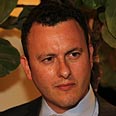
Matthew Gould
Photo: Mati Milstein
Since taking up his position in Israel
in September 2010, British Ambassador Matthew Gould has tried to promote cooperation between Britain and Israel in the fields of high-tech and technology, telling Calcalist this week that “there is enormous potential for the UK to use Israel's innovation.”
He went on to say that the British National Health Service (NHS) offers “one of the best and probably largest single customers in the world for medical innovation,” and that “Israel can provide the UK with a reservoir of relatively low-cost and high quality innovation which the UK could easily tap into.”
“The UK can provide Israel with the access to capital and professional services, the commercial skills needed to grow companies, the market access to Europe, and the bigger partners that Israeli companies need,” Gould said.
Economic Ties
UK Trade & Investment's annual FDI report says there were 16 new projects from Israel in 2009-10. PM Cameron: UK committed to helping world’s best companies thrive
He noted that Britain needs momentum for economic growth following the global financial crisis and its aftermath.
“In the last three months,” Gould said, “my team and I have put together three initiatives to scope out the potential here, and start to exploit it more fully. First, we have helped the British Israeli Chamber of Commerce to reinvent itself, set up a Tech Council, and launch a high-tech initiative which we have designed with them. The initiative puts leading British tech entrepreneurs in charge of developing strategies in the three sectors which we have agreed with the Chamber – water, consumer software and health care.”
“Second, allied to the Chamber’s High Tech initiative, in January I hosted a round table on building a UK-Israel high-tech partnership. We brought ten top British tech entrepreneurs, VCs, investment funds, and their Israeli counterparts. Together, we aim to identify the potential synergies between the UK and Israeli high-tech economies, the hurdles that have stopped Israeli companies looking to the UK, and stopped British companies coming to Israel, and what we need to do to get over those hurdles.”
The third initiative aims to strengthen scientific links between the UK and Israel, focusing on life sciences. Within the framework of the third initiative, a launch meeting was held at the British-Israel Life Sciences Council in Jerusalem last week.
Immense strengths in field of life sciences
Gould will serve as chairman of the Council, which is comprised of experts and senior researchers from Britain and Israel. Council members include Ben-Gurion University President Rivka Carmi; winner of the Nobel Prize in Chemistry, Professor Ada Yonath, from the Weizmann Institute; winner of the Nobel Prize in Chemistry, Professor John Walker, from Cambridge University; and Professor Lorna Casselton, vice president of the Royal Society. According to Gould, the Council demonstrates the British government's opposition to boycotting Israel.The ambassador noted that Britain and Israel both have immense strengths in the field of life sciences. He pointed out the disproportionate number of Nobel Prize winners in the two countries and said that some of history's most important studies have been conducted in Britain and Israel, making it only natural for the two science communities to cooperate.
Gould, who served for two years as the deputy British ambassador to Tehran, noted the tremendous sense of suspicion from Iranian authorities throughout his tenure in Iran, stating that the Iranian people definitely deserve a better government.
In response to a question on whether the Egyptian people deserve a better government, Gould cautiously replied that he was refraining from speculating on this matter.
- Follow Ynetnews on Facebook















